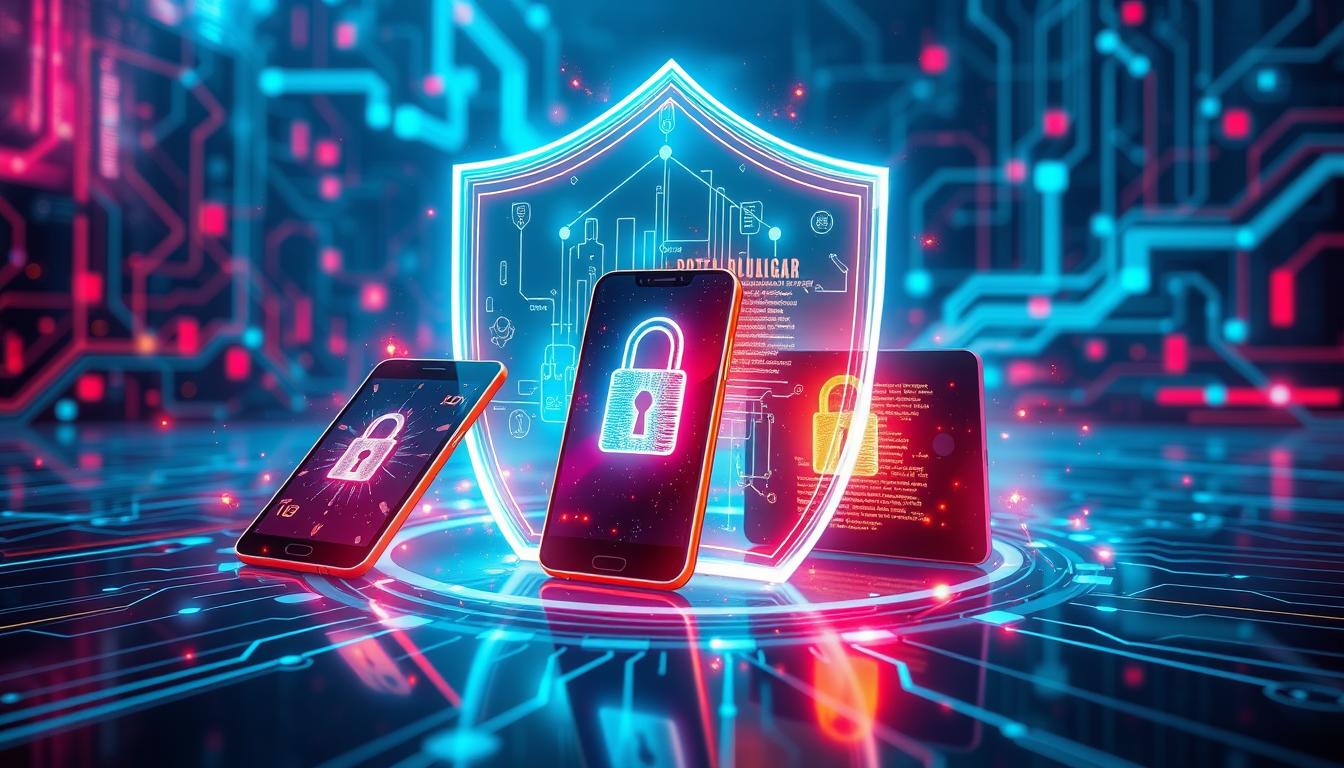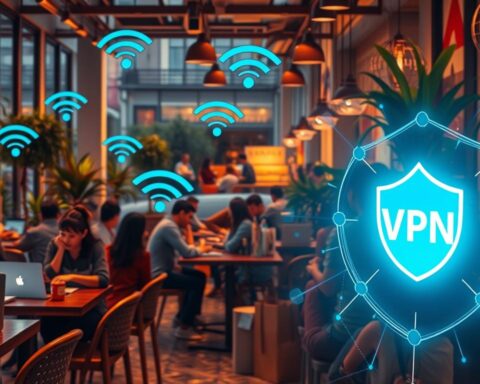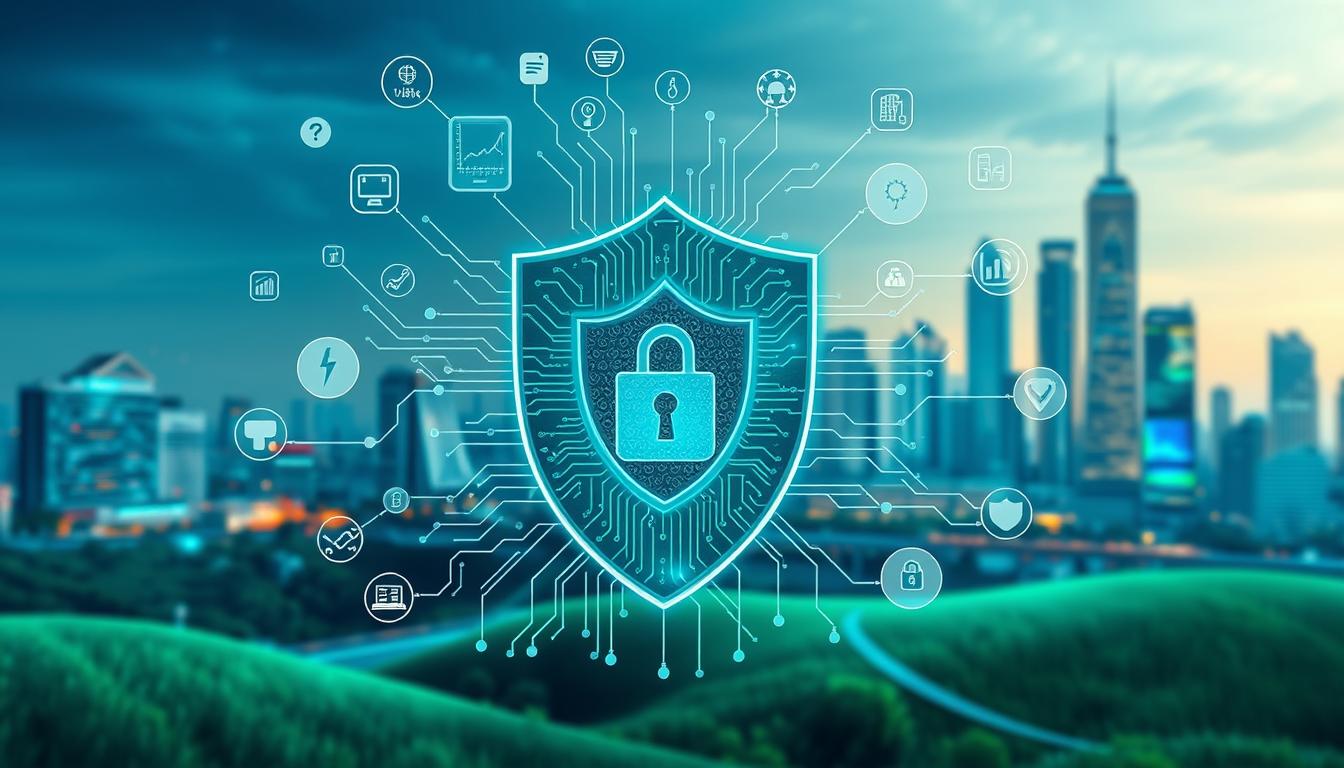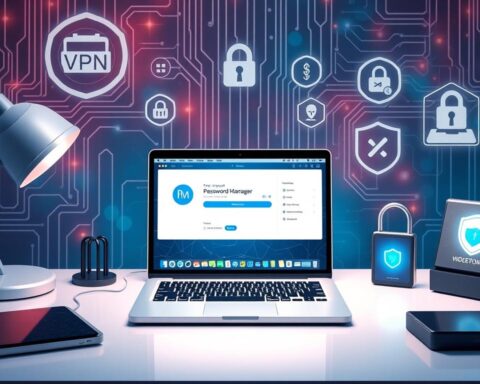Did you know over 70% of online banking is done on mobile devices? This makes them a big target for hackers1. Today, we’re focusing on keeping your smartphones and tablets safe from cyber threats.
Mobile devices are key for both work and personal life. But, they also make us more vulnerable to cyber attacks. With hackers causing about 30% of identity theft on mobiles, protecting them is more important than ever1.
Companies have made smartphones a big part of work life over the last ten years. But, this has brought new risks. Mobiles can get lost or stolen, leading to attacks like data leaks and spyware2. We’ll teach you how to keep your mobiles safe.
In this guide, we’ll cover the basics and advanced tips for keeping your devices secure. We’ll talk about how to keep your data safe, from using strong passwords to managing apps and networks. Our goal is to make sure your devices are strongholds of protection.
Key Takeaways
- Mobile devices are prime targets for cyberattacks due to their widespread use in banking and personal activities.
- Implementing strong authentication methods is critical for mobile security.
- Regular software updates and data backups are key preventive steps.
- Safe app management and network security practices greatly reduce risks.
- Training employees and raising awareness are vital for a strong mobile security plan.
Understanding Mobile Device Security Fundamentals
Mobile devices are now a big part of our lives and work. They hold lots of personal and business data, making them a target for hackers. Let’s look at the main parts of mobile security to keep your data safe.
Types of Mobile Security Threats
Mobile devices face many security risks. Malware, phishing, and data theft are big threats to privacy. Losing a device can also expose your data to others3. SMS phishing has grown by 328% in two years, showing how threats change4.
Impact of Security Breaches on Mobile Devices
Security breaches can cause big problems. The cost of a data breach can be in the millions, showing the need for good mobile security5. About 47% of data breaches happen on mobile devices, making them vulnerable4. For example, the TJ Maxx breach exposed 45.6 million credit and debit card numbers due to weak Wi-Fi5.
Core Security Components for Mobile Protection
Good mobile protection needs a few key things. Encryption, malware protection, and keeping data private are the base of a strong security plan. Using strong passwords or biometrics helps keep devices safe from unauthorized access3. VPNs also help a lot when using public Wi-Fi35.
| Security Component | Function | Importance |
|---|---|---|
| Mobile Device Encryption | Protects data stored on device | Critical for data privacy |
| Malware Protection | Prevents malicious software attacks | Essential for device integrity |
| VPN | Secures data transmission | Vital for public Wi-Fi use |
It’s important to use these security steps, as 75% of companies don’t have a mobile security policy4. Knowing these basics helps you protect your mobile devices and the data they hold.
Mobile Device Security: Protecting Your Smartphones and Tablets
In today’s world, keeping your mobile devices safe is key. With more people working from home and cyber threats on the rise, it’s vital to protect your smartphones and tablets. Here are some important steps to keep your devices secure.
The mobile security market is growing fast, expected to grow by 22.4% from 2021 to 20286. This shows how urgent it is to protect against new threats. In 2022, over 30% of corporate data breaches involved mobile devices, showing how vulnerable they are in work settings6.
Remote wipe is a must-have feature. It lets you erase your device’s data if it’s lost or stolen, keeping your info safe. Adding two-factor authentication also boosts security, making it harder for hackers to get in even if they guess your password.
Mobile antivirus is also essential. With malware attacks on mobile devices up by over 50% from 2020 to 2022, having antivirus software is critical6. It scans for threats, blocks bad websites, and keeps your device healthy.
“Mobile security is not just about protecting devices; it’s about safeguarding our digital lives.”
Don’t ignore software updates. A big 70% of mobile users skip security updates, leaving their devices open to attacks6. Keeping your device updated fixes security holes and keeps it safe.
By following these steps, you can lower the risk of data breaches and unauthorized access. Remember, mobile security is a constant effort that needs your ongoing attention and updates to stay ahead of threats7.
Essential Authentication Methods for Mobile Devices
In today’s digital world, keeping mobile devices safe is key. With over 3.8 billion smartphone users worldwide in 2023, strong security is more important than ever8. Let’s look at some ways to make your mobile device more secure.
Biometric Security Features
Biometric authentication has changed how we secure our phones. It uses unique features like fingerprints or faces to check who you are. Yet, 70% of users don’t use biometrics or passwords to lock their devices8. Using these features can greatly improve your device’s safety.
PIN and Password Best Practices
Even as biometrics improve, PINs and passwords are vital. Make strong, unique passwords for each account. Don’t use easy-to-guess info. By 2025, 50% of work and 20% of customer logins will be passwordless, up from 10% today9. For now, good password habits are a must.
Two-Factor Authentication Implementation
Two-factor authentication (2FA) adds a layer of security. It needs two verifications, making it hard for hackers to get in. Only 30% of users have 2FA on their accounts, even though it stops 99.9% of automated attacks8. Adding 2FA is a simple yet effective way to boost your security.
Mobile security is an ongoing battle. Keep up with new threats and update your security often. With these tips, you can make your mobile device much safer in our connected world.
Mobile Device Management (MDM) Solutions
Mobile Device Management (MDM) solutions are key for keeping smartphones and tablets safe. With 92% of companies using MDM, it’s a must-have for protecting data10. MDM software lets IT teams watch over, manage, and secure devices from afar. This boosts security for everyone.
The need for MDM is growing fast. The global MDM market is expected to hit $9.6 billion by 2025, with a 24.1% growth rate10. This shows how important strong mobile security is today.

- Remote device configuration
- Software distribution
- Compliance reporting
- Enhanced security policy enforcement
These features help lower risks from mobile devices accessing important business data11. Companies with good MDM plans see a 30% drop in mobile security risks10.
MDM is very important in Bring Your Own Device (BYOD) settings. With 79% of workers using personal devices for work, MDM makes managing these devices easier10.
| MDM Impact | Percentage |
|---|---|
| Organizations with MDM | 92% |
| Security risk reduction | 30% |
| Improved compliance | 54% |
Using MDM solutions helps businesses stay safe while keeping work flexible. This mix is key in today’s mobile-first world. Keeping data safe is essential for good cybersecurity.
Data Encryption and Protection Strategies
In today’s world, keeping data safe is key. With more people working from home, there’s a bigger risk of losing devices. This could lead to big financial losses and legal troubles1213.
Full Device Encryption
Full Disk Encryption (FDE) is a must for mobile security. It locks down all data on a device, making it unreadable without the right key. This is vital for keeping personal info, health records, and financial data safe1213.
Secure Data Transmission
End-to-End Encryption (E2EE) makes sure only the sender and receiver can see the data. It’s perfect for secure messaging. Plus, Key-Based Encryption scrambles data so only those with the right keys can read it12.
Cloud Storage Security
Businesses using mobile devices for card data need strong encryption. Many devices come with encryption options, but companies often forget to use them13.
| Encryption Type | Best For | Key Feature |
|---|---|---|
| Full Disk Encryption (FDE) | All device data | Protects entire storage |
| File-Based Encryption (FBE) | BYOD policies | Separates personal and work data |
| End-to-End Encryption (E2EE) | Messaging | Secures communication channel |
| Key-Based Encryption | Sensitive data | Requires specific keys for access |
Keeping encryption software up to date and training employees on security is key. With these steps, data stays safe, even if a device is lost or stolen.
Safe Mobile App Management
Keeping your mobile apps safe is key for both smartphones and tablets. With more cyber threats targeting mobiles, it’s important to protect your personal info.
App Store Security Guidelines
Always download apps from trusted stores like Apple’s App Store or Google Play. These places have strong security rules. But, about 60% of mobile malware comes from apps not from these stores14.
Make sure to check who made the app before you download. Sadly, 70% of users don’t do this14.
Permission Management
It’s important to check what permissions an app has. Over 60% of users don’t look at these after installing14. This can let apps access your data without permission.
Take time to review and adjust permissions for each app. This is important for apps that need access to your contacts or location.
Regular App Updates
Keeping your apps updated is a must for security. Not updating can increase data breach risk by 300%14. Updates often fix security holes.
Set your device to auto-update apps when it’s connected to Wi-Fi. This way, you’ll always have the latest, safest versions.
Remember, 91% of employees know public Wi-Fi and Bluetooth are risky, but 89% ignore these dangers15. Using a VPN when on public networks can boost your device’s security. By following these tips, you’ll greatly improve your mobile security.
Network Security for Mobile Devices
In today’s world, keeping your mobile devices safe is key. With 5 billion people online, strong security is more important than ever16.
Mobile devices face many dangers, like bad apps and phishing. Over 60% of fraud comes from mobiles, showing we need better security16. Using a Virtual Private Network (VPN) is a must, when using public Wi-Fi.
Data encryption is vital for mobile device security. Sadly, only 30% of apps encrypt data, leaving info at risk17. Encrypting all sensitive data on your device is a must for privacy.
Here are some key network security practices for mobile devices:
- Use a VPN when connecting to public Wi-Fi
- Regularly update device software and applications
- Enable automatic device locking after a short period of inactivity
- Implement strong password protection
By following these tips, you can lower your risk of cyber attacks. Users who update their devices often are 60% safer from software bugs17.
For more info on mobile device security, check out trusted sites and keep up with new security tips.
| Security Measure | Effectiveness |
|---|---|
| VPN Usage | 40% reduced risk of cyber threats |
| Regular Updates | 60% less likely to experience vulnerabilities |
| Password Protection | Significantly reduces unauthorized access |
| Data Encryption | Essential for protecting sensitive information |
By using these security steps, you can keep your mobile devices safe. This helps protect your data in our connected world.
Remote Device Management and Security
In today’s world, keeping devices safe is key. With more people working from home, companies must protect data on phones and tablets.
Remote Wiping Capabilities
Remote wipe is a must for mobile security. It lets IT teams wipe data from lost or stolen devices. This keeps company info safe. Businesses using MDM solutions see a 40% drop in data leaks18.
Device Location Tracking
Tracking devices is important for keeping them safe. MDM solutions help track devices better, improving security by over 50%18. This makes finding lost devices faster, cutting down recovery time by up to 60%18.
Backup and Recovery Options
Having good backup and recovery systems is vital. 60% of companies have data loss prevention policies to fight data theft18. These steps keep important data safe and easy to get back.
| MDM Feature | Benefit | Impact |
|---|---|---|
| Remote Wipe | Data Protection | 40% reduction in data leaks |
| Device Tracking | Asset Management | 50% improvement in compliance |
| Data Loss Prevention | Risk Mitigation | 60% of organizations implemented |
Getting strong mobile security solutions is essential. By 2026, the MDM market will hit $20.4 billion, showing its growing role19. Good remote management tools help IT teams focus on big projects, not just keeping devices running20.
Mobile Security Best Practices for Business Use
Businesses now rely heavily on mobile devices. It’s vital to have strong security measures in place. With 82% of organizations seeing mobile devices as big security risks, it’s time to act21.
BYOD Policy Implementation
A clear Bring Your Own Device (BYOD) policy is key. It should cover security steps like Mobile Device Management (MDM) and VPN use. Also, 50% of companies have faced data breaches from unsecured mobiles21.
Corporate Data Protection
Keeping corporate data safe is a top priority. Use multi-factor authentication to block 99.9% of automated attacks21. Also, encrypt important data and use secure cloud storage. In 2022, cyberattacks hit 2.2 million mobile devices, making up 9% of global attacks22.
Employee Training Guidelines
Training employees is vital for cybersecurity. Teach them about public Wi-Fi dangers, as 70% of users use it without protection21. Also, educate them on phishing, which causes 41% of malware and ransomware22.
By following these best practices, businesses can use mobile tech safely. Remember, a data breach in the U.S. costs about $9.36 million. This is a big price for ignoring mobile security22.
Emerging Mobile Security Threats and Countermeasures
The world of mobile devices is facing new security challenges. Today, mobile malware can steal data and encrypt it23. In 2014, Kaspersky found almost 3.5 million malware pieces on over 1 million devices. By 2017, they were processing 360,000 malicious files every day24.
Phishing attacks have also moved to mobile platforms. While 15% come from emails, most happen through messages, social media, and apps23. Mobile users are more at risk because of real-time email checks and limited screen info24.
With more people working from home, mobile devices are more important. Companies need strong mobile security solutions23. Many lack rules against using untrusted networks, making them open to MitM attacks23. A study showed how easy it was to hack British politicians on unsecured Wi-Fi24.
Jailbreaking and rooting make devices more vulnerable to data breaches23. OS vulnerabilities can be more dangerous than software exploits because they are below traditional security23.
To fight these threats, strong malware protection and mobile antivirus are key. Advanced mobile security measures should use AI and behavioral analysis. Encryption and secure sessions are vital to stop data breaches and unauthorized access.
New threats like SMiShing, BYOD policies, and IoT vulnerabilities make mobile security harder24. Companies need to spend more on mobile security, which is often underfunded compared to app development24. By staying updated and using strong countermeasures, we can protect our mobile devices in this changing threat world.
Conclusion
As we finish our look at mobile device security, it’s clear how vital it is. Over 10 million mobile devices were stolen in the U.S. in 2022. Also, 85% of corporate data is accessed through mobile devices, making security a top priority25.
The world of mobile security is always changing, with threats getting smarter. It’s scary that 30% of smartphone users have had their security breached or lost data. And 60% of users don’t keep their devices or apps up to date26. These facts show how important it is to have strong security and stay alert.
Looking to the future, the mobile device management market is set to hit $13 billion by 202625. With smartphone users expected to reach 4.3 billion by 2023, we must follow best practices. This includes keeping devices updated, using strong passwords, and backing up data regularly27. By doing these things and spreading security awareness, we can enjoy mobile technology safely and securely.
FAQ
What are the most common mobile security threats?
How can I secure my smartphone or tablet against cyber threats?
What is Mobile Device Management (MDM) and why is it important?
How does data encryption protect my mobile device?
What should I consider when managing mobile apps for security?
How can I protect my mobile device when using public Wi-Fi?
What is remote wiping and why is it important?
How can businesses implement effective BYOD policies?
What are some emerging mobile security threats to be aware of?
How often should I update my mobile device’s security measures?
Source Links
- How to Secure Your Mobile Device: 8 Tips for 2023 – https://www.tripwire.com/state-of-security/secure-mobile-device-six-steps
- Smartphone security – https://www.fraud-magazine.com/article.aspx?id=4294992799
- Mobile Devices – National Cybersecurity Alliance – https://www.staysafeonline.org/articles/mobile-devices
- The Ultimate Guide to Mobile Device Security in the Workplace – https://www.techtarget.com/searchmobilecomputing/The-ultimate-guide-to-mobile-device-security-in-the-workplace
- Wireless and Mobile Security Practices for the Workplace – https://www.apu.apus.edu/area-of-study/information-technology/resources/wireless-and-mobile-security-practices-for-the-workplace/
- What is mobile security? – https://www.jamf.com/blog/what-is-mobile-security/
- Microsoft Word – Mobile Security Handout.9.13 – https://www.cio.gov/assets/resources/Mobile Security Handout Final.pdf
- Mobile Device Security: Protecting Your Smartphone and Tablet – https://www.anonymoushackers.net/cybersecurity-news/mobile-device-security-protecting-your-smartphone-and-tablet/
- Secure Mobile Authentication 101 – https://www.daon.com/resource/mobile-authentication-101/
- What Is Mobile Device Management (MDM)? Why is it Important? | Fortinet – https://www.fortinet.com/resources/cyberglossary/mobile-device-management
- What is Mobile Device Management (MDM)? | IBM – https://www.ibm.com/think/topics/mobile-device-management
- Comprehensive Guide to Mobile Device Encryption | Miradore – https://www.miradore.com/blog/what-is-mobile-device-encryption/
- Securing Mobile Devices with Mobile Encryption – https://www.securitymetrics.com/blog/securing-mobile-devices-mobile-encryption
- Mobile Device Security: Safeguarding Your Smartphone and Tablet – Social Security – https://socialsecurity.gov.mt/en/mobile-device-security-safeguarding-your-smartphone-and-tablet/
- The 7 Mobile Device Security Best Practices You Should Know for 2024 – https://www.ntiva.com/blog/top-7-mobile-device-security-best-practices
- What Is Mobile Security? Threats and Prevention | Fortinet – https://www.fortinet.com/resources/cyberglossary/mobile-security
- What is Mobile Security in Cyber Security? – GeeksforGeeks – https://www.geeksforgeeks.org/what-is-mobile-security-in-cyber-security/
- Mobile Security Management | Mobile Device Security – https://www.manageengine.com/mobile-device-management/mobile-security-management.html
- What is remote device management? Best practices and tools for 2025 – https://growrk.com/blog/remote-device-management-guide
- Mobile Device Management (MDM) Enhances Security and Efficiency – https://blog.thriveon.net/mobile-device-management-mdm-enhances-security-and-efficiency-modern
- 10 Mobile Security Best Practices to Consider in 2024 – https://solutionsreview.com/mobile-device-management/mobile-security-best-practices-to-consider/
- 6 Mobile Device Security Best Practices Your Org Should Implement Today – https://redriver.com/security/mobile-device-security-best-practices
- Top 6 Mobile Security Threats and How to Prevent Them – Check Point Software – https://www.checkpoint.com/cyber-hub/threat-prevention/what-is-mobile-security/top-6-mobile-security-threats-and-how-to-prevent-them/
- Top 7 Mobile Security Threats – https://www.kaspersky.com/resource-center/threats/top-seven-mobile-security-threats-smart-phones-tablets-and-mobile-internet-devices-what-the-future-has-in-store
- The Importance of Mobile Device Security – https://lucidum.io/blog/the-importance-of-mobile-device-security/
- Mobile Device Security: Safeguarding Your Smartphone and Tablet – SPARK Services – https://sparkservices.net/mobile-device-security-safeguarding-your-smartphone-and-tablet/
- Mobile Device Security – https://www.linkedin.com/pulse/mobile-device-security-skillminetech-xnx0c







